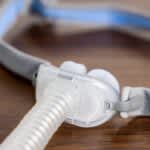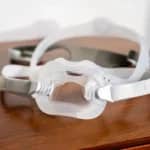Waking up gasping for air, choking, or coughing can feel terrifying. Nightmares may occasionally cause people to wake up in distress. But regularly waking up coughing, gasping for air, or choking could be a sign of a potentially serious medical condition.
We cover some common health conditions that cause shortness of breath during sleep, which can lead to waking up gasping for air.
Obstructive Sleep Apnea
People with obstructive sleep apnea (OSA) may wake themselves or a bed partner because of snoring, choking, or gasping for air. Sleep apnea occurs when relaxed muscles in the throat partially or fully block the airway.
Pauses in breathing, called apneas, and decreases in airflow, called hypopneas, cause lower blood oxygen levels and nighttime awakenings. OSA interferes with quality sleep, keeping you from waking up feeling rested.
OSA has been linked to serious complications such as stroke, heart disease, depression, and workplace and traffic accidents. However, treatment can reduce the risks of these complications.
Health care providers use sleep studies, called polysomnography, to diagnose OSA. Sleep studies involve sleeping overnight in a lab to monitor your heart, blood oxygen levels, body movement, airflow through your nose and mouth, and temperature.
OSA is commonly treated with continuous positive airway pressure (CPAP). Doctors may also recommend weight loss, smoking cessation, and avoiding or reducing alcohol use. People with OSA who snore, choke, or wake up gasping for air should avoid sleep aids and other medications that cause drowsiness.
If you have OSA, your sleep position can also help reduce snoring. Avoid sleeping on your back, and sleep with your head elevated or to your side.
Central Sleep Apnea
Central sleep apnea (CSA) occurs less commonly than OSA, affecting less than 1% of people. Like OSA, CSA causes repetitive pauses in breathing during sleep, excessive daytime sleepiness, frequent arousals from sleep, snoring, and choking. Apnea from CSA occurs when the brain momentarily stops communicating with the breathing muscles.
Many people who have CSA have underlying medical conditions such as congestive heart failure, kidney disease, or prior strokes. Some medications also may cause CSA, including sedatives and opioids. Cases of CSA without any underlying condition or medication are called idiopathic central sleep apnea.
Diagnosing CSA may involve several tests. In addition to a physical examination, a doctor may order a sleep study and tests to identify any underlying medical conditions. Other diagnostic tests may include an echocardiogram, magnetic resonance imaging (MRI), lung function tests, and blood tests.
As many as 20% of CSA occurrences go away without any treatment. When treatment is needed, it usually involves addressing the underlying condition. Depending on a person’s symptoms, their doctor may also prescribe CPAP therapy.
Heart Failure
Heart failure may cause shortness of breath and trouble sleeping. Heart failure happens when the heart is too weak to circulate enough blood to the rest of the body. When the heart does not pump efficiently, fluid can build up in the lungs and create breathing problems. People with heart failure often have a hard time breathing when they are lying down flat, called orthopnea.
To diagnose heart failure, your doctor will perform a physical exam, ask about your family’s medical history, and order heart and blood tests. Your doctor might refer you to a heart specialist, called a cardiologist.
Although there isn’t a cure for heart failure, treatment can reduce symptoms and may prolong your lifespan. Treatment includes medications and lifestyle changes such as smoking cessation, reducing dietary salt, stress management, and physical activity. Some people with heart failure may need surgery or a pacemaker.
Heart Failure and Sleep-Disordered Breathing
Sleep-disordered breathing affects up to half of all people with heart failure and about three-quarters of people with severe heart failure. Treating sleep-related breathing disorders, including OSA and CSA, can improve symptoms of heart failure. Likewise, treating heart failure can also improve sleep-disordered breathing.
Cheyne-Stokes breathing is an irregular respiratory rate that can occur in people with heart failure and CSA. It creates a breathing pattern in which people temporarily stop breathing, followed by fast breathing, and then slowed breathing until the cycle repeats. Treatment of Cheyne-Stokes breathing includes supplemental oxygen or nasal CPAP.
Anxiety
Anxiety causes symptoms including fear, tension, shortness of breath, and a rapid heartbeat. For some people, anxiety can be a natural, even useful reaction to stressful situations. But for someone with an anxiety disorder such as panic attacks, these feelings may happen even with no danger present.
People with nocturnal panic attacks wake up at night gasping for breath in intense distress. Nocturnal panic attacks may appear similar to symptoms of night terrors, sleep apnea, or epilepsy. However, nocturnal panic attacks occur during different sleep stages from these events.
To diagnose an anxiety disorder, your doctor will ask about your health history and symptoms. You might also have lab tests and an exam to rule out other medical conditions that could cause your symptoms.
Treatment options for anxiety disorder include talk therapy, cognitive behavioral therapy, and medication.
Asthma
Asthma happens when the airways swell and become narrow, making breathing difficult. Up to 7 in 10 people with asthma experience symptoms at night at least monthly.
The symptoms of nocturnal asthma include wheezing, coughing, chest tightness, and shortness of breath. Although the cause remains unknown, genetics and irritants in the surrounding environment likely contribute to asthma.
Physicians diagnose asthma by asking about your medical history and conducting a physical exam and lung function tests. If you also have symptoms of allergies, then the doctor may also do allergy tests.
To treat asthma, you’ll need to identify what triggers your attacks and do your best to avoid those triggers. Your doctor may also prescribe medications like inhalers or steroid medications to control your asthma and prevent asthma attacks.
Seek emergency medical care if you have an asthma attack that is severe and isn’t helped by your medications.
Allergies
People with allergic rhinitis, also known as seasonal allergies or hay fever, commonly experience symptoms at night. Postnasal drip and coughing can disrupt sleep for people with allergic rhinitis. Nasal congestion can also cause snoring and sleep apnea.
Allergic rhinitis is diagnosed through a detailed history of your symptoms, including anything that may have brought them on, and a physical examination. You might also get an allergy skin test and blood tests.
Identifying and avoiding your allergens, if possible, is key to help control allergic rhinitis. Your doctor may also prescribe medications such as corticosteroids, antihistamines, and decongestants.
Acid Reflux
Acid reflux, also called gastroesophageal reflux disease (GERD), happens when the muscle at the end of the esophagus is too relaxed, allowing food and acid to come up from the stomach. The burning sensation in the throat and chest from acid reflux, commonly called heartburn, worsens with lying down. Heartburn can cause shortness of breath and cough and interfere with sleep.
Your doctor will review your symptoms to diagnose GERD and may order certain tests, like an upper endoscopy to view the stomach, esophagus, and part of the small intestine with a camera.
Many people can reduce GERD symptoms by avoiding alcohol and spicy foods, not eating too close to bedtime, and eating smaller meals. If those lifestyle changes don’t improve the symptoms of GERD, then a doctor might prescribe medication or even recommend surgery.
People with GERD should avoid sleeping flat on their backs. Research shows that sleeping on an incline or on your side reduces symptoms of reflux.
When to Speak to Your Doctor
Waking up gasping for air can happen for a lot of reasons. It doesn’t necessarily mean you have a serious health condition.
If you have shortness of breath or are waking gasping for air on a regular basis and it is affecting your sleep or your daytime functioning, talk with your doctor. They can help determine the cause of your symptoms and suggest treatment options.
References
The Sleep Doctor Forum: Real Experiences, Real Connections
Continue the discussion on the Sleep Doctor Forum. Connect with experts and fellow forum members on CPAP, sleep apnea, and all things sleep. A priceless resource that’s free to join.








































